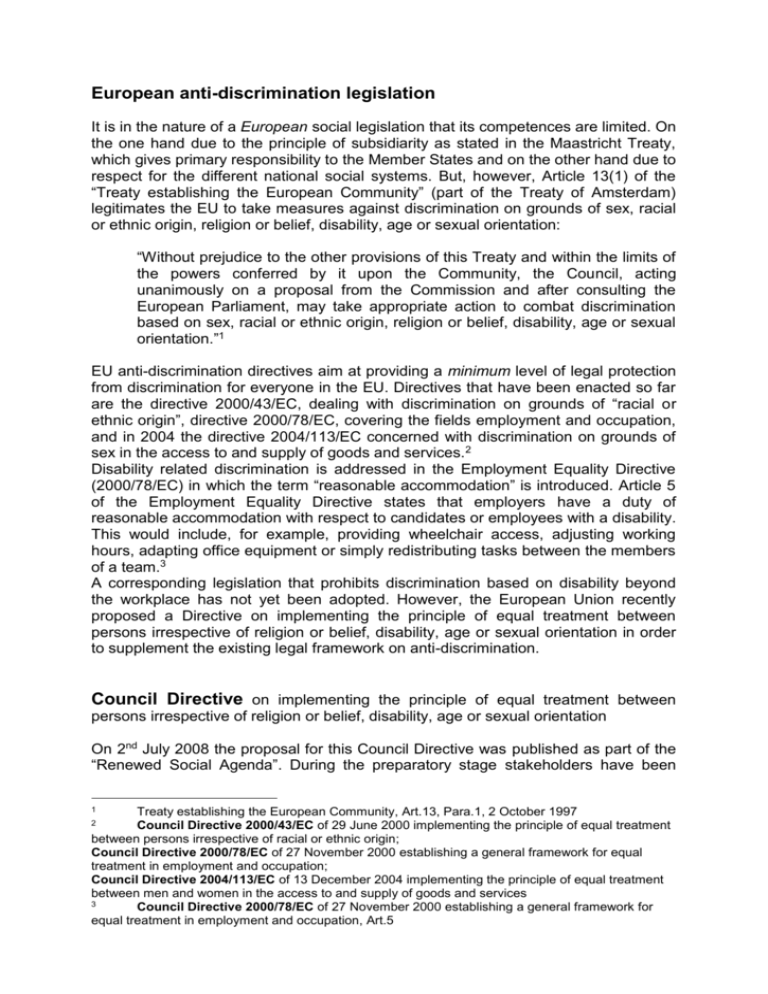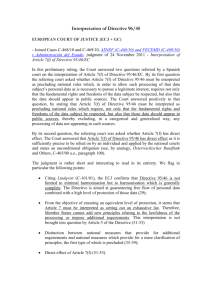
European anti-discrimination legislation
It is in the nature of a European social legislation that its competences are limited. On
the one hand due to the principle of subsidiarity as stated in the Maastricht Treaty,
which gives primary responsibility to the Member States and on the other hand due to
respect for the different national social systems. But, however, Article 13(1) of the
“Treaty establishing the European Community” (part of the Treaty of Amsterdam)
legitimates the EU to take measures against discrimination on grounds of sex, racial
or ethnic origin, religion or belief, disability, age or sexual orientation:
“Without prejudice to the other provisions of this Treaty and within the limits of
the powers conferred by it upon the Community, the Council, acting
unanimously on a proposal from the Commission and after consulting the
European Parliament, may take appropriate action to combat discrimination
based on sex, racial or ethnic origin, religion or belief, disability, age or sexual
orientation.”1
EU anti-discrimination directives aim at providing a minimum level of legal protection
from discrimination for everyone in the EU. Directives that have been enacted so far
are the directive 2000/43/EC, dealing with discrimination on grounds of “racial or
ethnic origin”, directive 2000/78/EC, covering the fields employment and occupation,
and in 2004 the directive 2004/113/EC concerned with discrimination on grounds of
sex in the access to and supply of goods and services. 2
Disability related discrimination is addressed in the Employment Equality Directive
(2000/78/EC) in which the term “reasonable accommodation” is introduced. Article 5
of the Employment Equality Directive states that employers have a duty of
reasonable accommodation with respect to candidates or employees with a disability.
This would include, for example, providing wheelchair access, adjusting working
hours, adapting office equipment or simply redistributing tasks between the members
of a team.3
A corresponding legislation that prohibits discrimination based on disability beyond
the workplace has not yet been adopted. However, the European Union recently
proposed a Directive on implementing the principle of equal treatment between
persons irrespective of religion or belief, disability, age or sexual orientation in order
to supplement the existing legal framework on anti-discrimination.
Council Directive on implementing the principle of equal treatment between
persons irrespective of religion or belief, disability, age or sexual orientation
On 2nd July 2008 the proposal for this Council Directive was published as part of the
“Renewed Social Agenda”. During the preparatory stage stakeholders have been
1
Treaty establishing the European Community, Art.13, Para.1, 2 October 1997
Council Directive 2000/43/EC of 29 June 2000 implementing the principle of equal treatment
between persons irrespective of racial or ethnic origin;
Council Directive 2000/78/EC of 27 November 2000 establishing a general framework for equal
treatment in employment and occupation;
Council Directive 2004/113/EC of 13 December 2004 implementing the principle of equal treatment
between men and women in the access to and supply of goods and services
3
Council Directive 2000/78/EC of 27 November 2000 establishing a general framework for
equal treatment in employment and occupation, Art.5
2
invited to contribute to and to comment on the proposal. But though organisations
like the European Disability Forum (EDF) have been lobbying for years for a
disability-specific Directive, the Commission did not consider this concern and
decided that a horizontal approach with a “multi-ground directive would be the
appropriate response”, but “disability-related discrimination” will be “addressed in a
specific Article”4 of the Directive.
Similar to existing legislation the term equal treatment stands for prohibition of
discrimination. In the case of the current directive it refers to discrimination on
grounds of religion or belief, disability, age or sexual orientation and “shall apply […]
in relation to:
(a) Social protection, including social security and healthcare;
(b) Social advantages;
(c) Education;
(d) Access to and supply of goods and other services which are available to the
public, including housing.”5
But beyond it paragraph 3 also makes following restrictions:
“This Directive is without prejudice to the responsibilities of Member States for
the content of teaching, activities and the organisation of their educational
system, including the provision of special needs education. […]”6
Specific disability related discrimination is addressed in Article 4 of the present
proposal stating that persons with disabilities shall be given effective nondiscriminatory access to the abovementioned scopes and provided with reasonable
accommodation. Specifications about what is reasonable are defined as follows:
respective “measures should not impose a disproportionate burden, nor require
fundamental alteration […] or require the provision of alternatives” taking into account
“size and resources of the organisation, its nature, the estimated cost, the life cycle of
the goods and services, and the possible benefits of increased access for persons
with disabilities”7!
The Articles 5-18 of the proposal (except for Article 12) are part of all Council
Directives based on Article 13 of the “Treaty establishing the European Community”.
They deal with remedy and enforcement matters and with reporting and
implementation. Against it, Article 12 is missing in the Employment Equality Directive
(2000/78/EC). It says Member States need to establish an “Equality Body” at national
level to give independent help to victims of discrimination and to publish independent
surveys and reports on issues relating to discrimination. Whereas the body can be
part of already existing agencies charged with the defence of rights under other
Council Directives including 2000/43/EC and 2004/113/EC8.
Before being transposed into national law of the Member States, the proposal has to
pass the European Parliament and the Council of Ministers. After publication in the
Official Journal of the EU, Member States shall adopt the laws and provisions
necessary within two years. For regulations set out in Article 4 of the proposal Equal
4
Proposal for a Council Directive implementing the principle of equal treatment between
persons irrespective of religion or belief, disability, age or sexual orientation, 2 July 2008
5
Id., Art.3, Scope, para.1
6
Id., Art.3, Scope, para.3
7
Id., Art.4, Equal treatment of persons with disabilities
8
Id., Art.12, Bodies for the Promotion of Equal Treatment
treatment of persons with disabilities an additional two year period for implementation
is provided taking “account of particular conditions”9.
Along with the proposal on equal treatment beyond the workplace the Commission
came up with the Communication on ‘Non-discrimination and equal opportunities: A
renewed commitment’ acknowledging that combating discrimination “cannot be won
by legislation alone” but by “changing attitudes and behaviour”10. In order to achieve
equal treatment and opportunities the communication shall complete the legal
framework by promoting positive action, awareness raising and mainstreaming11.
Nadine Piecha August 2008
ENIL Secretariat
Address: Gran Vía Marqués del Turia nº 49 - 7º 12ª
46005 Valencia Spain
Voice: +49 671 9202991
Mail: secretariat@enil.eu
9
ENIL is supported by:
European Commission
Id., Art.15, Implementation
Communication from the Commission to the European Parliament, the Council, the European
Economic and Social Committee and the Committee of the Regions, Non-discrimination and equal
opportunities: A renewed commitment
11
Id.
10








